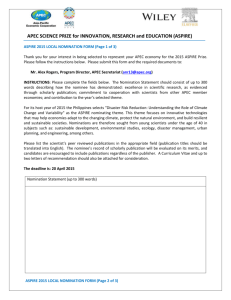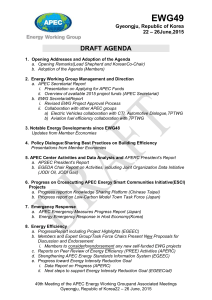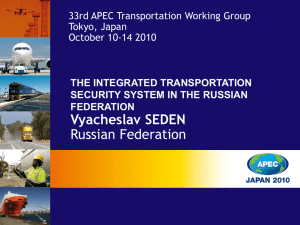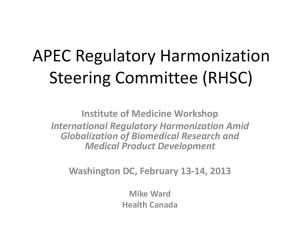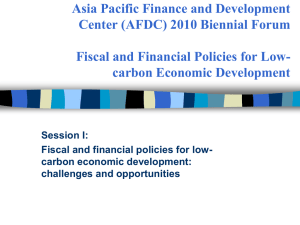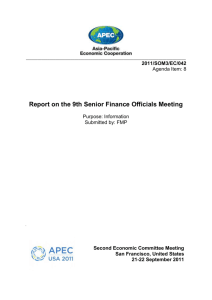19th APEC ECONOMIC LEADERS` MEETING
advertisement
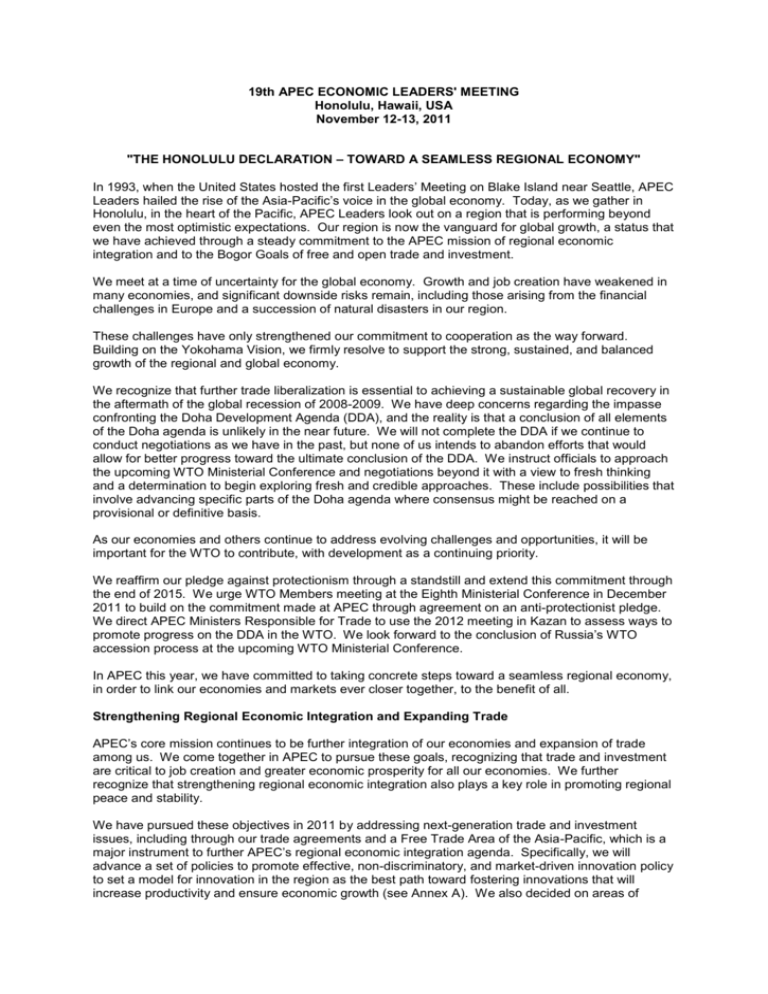
19th APEC ECONOMIC LEADERS' MEETING Honolulu, Hawaii, USA November 12-13, 2011 "THE HONOLULU DECLARATION – TOWARD A SEAMLESS REGIONAL ECONOMY" In 1993, when the United States hosted the first Leaders’ Meeting on Blake Island near Seattle, APEC Leaders hailed the rise of the Asia-Pacific’s voice in the global economy. Today, as we gather in Honolulu, in the heart of the Pacific, APEC Leaders look out on a region that is performing beyond even the most optimistic expectations. Our region is now the vanguard for global growth, a status that we have achieved through a steady commitment to the APEC mission of regional economic integration and to the Bogor Goals of free and open trade and investment. We meet at a time of uncertainty for the global economy. Growth and job creation have weakened in many economies, and significant downside risks remain, including those arising from the financial challenges in Europe and a succession of natural disasters in our region. These challenges have only strengthened our commitment to cooperation as the way forward. Building on the Yokohama Vision, we firmly resolve to support the strong, sustained, and balanced growth of the regional and global economy. We recognize that further trade liberalization is essential to achieving a sustainable global recovery in the aftermath of the global recession of 2008-2009. We have deep concerns regarding the impasse confronting the Doha Development Agenda (DDA), and the reality is that a conclusion of all elements of the Doha agenda is unlikely in the near future. We will not complete the DDA if we continue to conduct negotiations as we have in the past, but none of us intends to abandon efforts that would allow for better progress toward the ultimate conclusion of the DDA. We instruct officials to approach the upcoming WTO Ministerial Conference and negotiations beyond it with a view to fresh thinking and a determination to begin exploring fresh and credible approaches. These include possibilities that involve advancing specific parts of the Doha agenda where consensus might be reached on a provisional or definitive basis. As our economies and others continue to address evolving challenges and opportunities, it will be important for the WTO to contribute, with development as a continuing priority. We reaffirm our pledge against protectionism through a standstill and extend this commitment through the end of 2015. We urge WTO Members meeting at the Eighth Ministerial Conference in December 2011 to build on the commitment made at APEC through agreement on an anti-protectionist pledge. We direct APEC Ministers Responsible for Trade to use the 2012 meeting in Kazan to assess ways to promote progress on the DDA in the WTO. We look forward to the conclusion of Russia’s WTO accession process at the upcoming WTO Ministerial Conference. In APEC this year, we have committed to taking concrete steps toward a seamless regional economy, in order to link our economies and markets ever closer together, to the benefit of all. Strengthening Regional Economic Integration and Expanding Trade APEC’s core mission continues to be further integration of our economies and expansion of trade among us. We come together in APEC to pursue these goals, recognizing that trade and investment are critical to job creation and greater economic prosperity for all our economies. We further recognize that strengthening regional economic integration also plays a key role in promoting regional peace and stability. We have pursued these objectives in 2011 by addressing next-generation trade and investment issues, including through our trade agreements and a Free Trade Area of the Asia-Pacific, which is a major instrument to further APEC’s regional economic integration agenda. Specifically, we will advance a set of policies to promote effective, non-discriminatory, and market-driven innovation policy to set a model for innovation in the region as the best path toward fostering innovations that will increase productivity and ensure economic growth (see Annex A). We also decided on areas of cooperation that could be included in our trade agreements to enhance the participation of small and medium-sized enterprises (SMEs) in global production chains (see Annex B). In addition, we will take the following steps to further open markets and facilitate regional trade: Establish commercially useful de minimis values in our economies that will exempt low-value shipments from customs duties and streamline entry documentation requirements, as a key contribution to our goal of an APEC-wide 10 percent improvement in supply-chain performance by 2015; Undertake specific actions to address the top barriers that SMEs face in trading in the region to boost the capacity of these companies to contribute to economic growth and job creation in our economies; Play a leadership role in launching negotiations to expand the product coverage and membership of the WTO Information Technology Agreement, in order to build on the contribution this Agreement has made to promoting trade and investment and driving innovation in APEC economies; Launch the APEC Travel Facilitation Initiative to explore ways to make travel in the region faster, easier, and more secure; Implement our APEC New Strategy for Structural Reform plans by 2015 in order to reduce behind-the-border barriers and promote balanced, inclusive, and sustainable growth; Implement the APEC Cross Border Privacy Rules System to reduce barriers to information flows, enhance consumer privacy, and promote interoperability across regional data privacy regimes; Implement the Niigata Declaration on Food Security, and reaffirm our commitment to a standstill, first made by APEC Leaders in 2008, as it pertains to export restrictions and other WTOinconsistent trade measures; and Facilitate commerce and promote economic growth by pursuing liberalization of air cargo services. Promoting Green Growth We are committed to advancing our shared green growth objectives. We can and must address both the region’s economic and environmental challenges by speeding the transition toward a global lowcarbon economy in a way that enhances energy security and creates new sources of economic growth and employment. We have advanced these objectives significantly in 2011. In 2012, economies will work to develop an APEC list of environmental goods that directly and positively contribute to our green growth and sustainable development objectives, on which we are resolved to reduce by the end of 2015 our applied tariff rates to 5% or less, taking into account economies’ economic circumstances, without prejudice to APEC economies’ positions in the WTO. Economies will also eliminate non-tariff barriers, including local content requirements that distort environmental goods and services trade (see Annex C). Taking these concrete actions will help our businesses and citizens access important environmental technologies at lower costs, which in turn will facilitate their use, contributing significantly to APEC’s sustainable development goals. We will also take the following steps to promote our green growth goals: Rationalize and phase out inefficient fossil-fuel subsidies that encourage wasteful consumption, while recognizing the importance of providing those in need with essential energy services, and set up a voluntary reporting mechanism on progress, which we will review annually; Aspire to reduce APEC's aggregate energy intensity by 45 percent by 2035; 2 Promote energy efficiency by taking specific steps related to transport, buildings, power grids, jobs, knowledge sharing, and education in support of energy-smart low-carbon communities; Incorporate low-emissions development strategies into our economic growth plans and leverage APEC to push forward this agenda, including through the Low-Carbon Model Town and other projects; and Work to implement appropriate measures to prohibit trade in illegally harvested forest products and undertake additional activities in APEC to combat illegal logging and associated trade. Regulatory Convergence and Cooperation Regulatory reform, including eliminating unjustifiably burdensome and outdated regulations, can boost productivity and promote job creation, while also protecting the environment and public health, safety, and security. In addition, as trade and investment flows become more globalized, greater alignment in regulatory approaches, including to international standards, is necessary to prevent needless barriers to trade from stifling economic growth and employment. This year, we have advanced these objectives by committing to take specific steps by 2013 to implement good regulatory practices in our economies, including by ensuring internal coordination of regulatory work; assessing regulatory impacts; and conducting public consultation (see Annex D). We will also take the following steps to increase convergence and cooperation in our regulatory systems: Pursue common objectives to prevent technical barriers to trade related to emerging green technologies, including smart grid interoperability standards, green buildings, and solar technologies; Strengthen food safety systems and facilitate trade, including by supporting the Global Food Safety Fund – an innovative capacity-building partnership with the World Bank; and Ensure implementation of our APEC anti-corruption and open government commitments by 2014 through deeper cooperation in APEC. Looking Forward To promote strong, inclusive regional growth, we commit to take concrete actions to expand economic opportunities for women in APEC economies. We welcome the San Francisco Declaration on Women and the Economy and pledge to monitor its implementation. We applaud the contributions of the APEC Business Advisory Council (ABAC) to our work. Recognizing that private enterprise is the engine of trade, investment, and innovation, we have committed ourselves to enhancing the role of the private sector in APEC, through greater input into APEC’s working groups and the establishment of new public-private Policy Partnerships. Expressing solidarity with the people affected by tragic natural disasters, we pledge to incorporate the private sector and civil society more substantively into our emergency preparedness efforts, as a critical piece of our efforts to build more resilient communities and businesses. Recognizing the range of experiences and systems across APEC economies, we reaffirm the importance of supporting our ambitious vision for a seamless regional economy through our abiding commitment to delivering effective economic and technical cooperation. Enormous progress has been made. But our work toward a truly seamless regional economy is only in the beginning stages. We instruct our ministers and officials to carry forward this work and to strengthen the economic foundation of our shared Asia-Pacific community. We look forward to reviewing further progress when we convene again during Russia’s hosting of APEC in 2012. # # # 3 #
